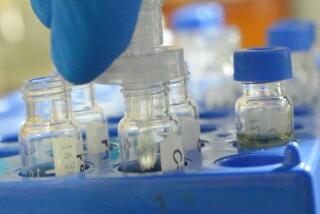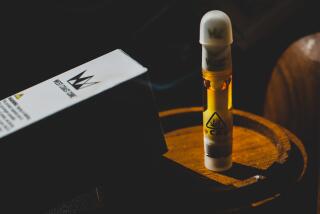Surge in Stock of Testing Firm Stirs Questions
- Share via
Somebody bought a lot of shares last week in U.S. Alcohol Testing, a tiny Rancho Cucamonga-based firm that has been short on profits but an active self-promoter and money-raiser.
USAT’s stock, on the American Stock Exchange, jumped from $1.125 on Monday to almost $3 on Friday before trading was halted. Even more significant was the trading volume: 1.68 million shares on Wednesday, 1.37 million Thursday and 786,900 Friday before the halt. All that for a firm with 10 million shares outstanding.
USAT, which on Wednesday said it wasn’t sure what was moving its stock, is supposed to make a statement today. But the catalyst for much of the activity may already be known: The federal Department of Transportation’s proposal Thursday to begin random alcohol breath-testing among some seven million trucking, airline, rail and bus workers.
Because USAT’s main product line consists of alcohol breath-testers, some investors may be betting on a profit windfall for the five-year-old firm--which recorded a $3.28 million loss on just $1.59 million in sales in the six months ended Sept. 30.
But whether USAT will ever see a dime from the transportation program is far from certain. The proposal has been in the works for more than a year, and much about it has yet to be decided, including whether the government or individual transportation firms should do the actual testing.
A bigger question is USAT’s ability to compete with larger and better-known intoxication-testing equipment makers--especially when USAT management has been busy with several unrelated business ventures and an apparent feud with some of the firm’s early financiers.
Over the past year, USAT has heavily promoted its alcohol-testing devices for law enforcement agencies (Alco-Analyzer) and the consumer market (Final Call, a $2.50 self-testing breath analyzer sold in some convenience stores). The consumer device in particular has been the subject of a flurry of USAT press releases.
Yet in its quarterly earnings reports, the firm has said nothing about its sales success with the products. In fact, in the Sept. 30 financial report filed with the Securities and Exchange Commission, USAT said its first-half revenue growth, to $1.59 million from $386,850 a year earlier, was “attributable to the company’s June, 1992 acquisition of Good Ideas Enterprises Inc.”
Good Ideas is a Texas-based toy maker. What do toys have to do with alcohol testing? USAT President James C. Witham, who came to run the company after a career as a professional salesman, failed to return numerous calls for comment last Friday.
Meanwhile, in its latest interesting acquisition, USAT in November bought Advanced Flooring Inc., which recycles used tires into floor mats.
The cash that has supported USAT’s increasingly disparate mini-empire--including a Netherlands subsidiary formed this year--has come from a wave of securities offerings, including $10.2 million raised via sales of preferred stock and warrants in 1991.
But the value of those securities is directly tied to the value of USAT’s common stock. And as the stock’s price has crashed this year after spiking to almost $11 last January, some of the firm’s big investors have turned hostile.
Last Wednesday two Long Island, N.Y., men--investment banker Jeffrey Brooks, and Gary Nadelman, a ladies’ sportswear manufacturer--told the SEC that they control 6.7% and 4.2%, respectively, of USAT’s shares. The filings were needed because the preferred stock and warrants that Brooks and Nadelman had previously purchased from USAT became convertible into common stock in November.
What made the filings particularly noteworthy was that USAT announced on Nov. 17 that it had severed its relationship with Brooks, who had been the firm’s investment banker through his Brooks Securities of Hewlet, N.Y.
Asked on Friday to explain the feud, Brooks said tersely “I’m not commenting on anything,” then hung up the phone.
The consulting services of Brooks’ brother, David, also have been terminated, according to USAT. Coincidently, USAT paid $110,125 in cash and $292,500 in stock warrants in the third quarter to settle a $1 million lawsuit filed by a “former consultant.” Whether that was David Brooks isn’t clear.
With suddenly unfriendly major shareholders in the wings, the big risk to USAT is that its access to new financing could be hampered. Were the company to try additional convertible-stock sales, for example, it would effectively be diluting any future share of earnings to existing common-stock holders like the Brooks brothers--who naturally could object.
Already, USAT has been forced to cancel the proposed stock spinoff of its fledgling drug-testing unit, a venture developed with new U.S. Navy technology and touted by USAT as holding great promise. The spinoff was announced Oct. 26, then canceled Nov. 17 because of “adverse shareholder response.”
Even so, in its third-quarter financial statement USAT said it has “sufficient cash resources” to carry it for the next 12 months, even if cash flow from operations is negative. The firm added, moreover, that “although the company has not generated revenues from operations, management anticipates that material cash flow from operations will occur” this quarter and the first quarter of 1993.
Which brings us back to the alcohol-testing line, USAT’s supposed bread and butter: How viable a business is it?
The disposable retail product, Final Call, was endorsed by the National Troopers Coalition in February as a way for drinking drivers to make “an informed decision” about whether they’ve had one too many. But such do-it-yourself analyzers are controversial because of worries about their accuracy and the drinking driver’s personal interpretation of the test.
If USAT has scored a sales hit with Final Call, it hasn’t said so.
In any case, with the new transportation-worker testing proposal, USAT investors are likely to be far more intrigued with the professional line of alcohol analyzers.
In a brief interview earlier last week, USAT’s Witham said the company has “positioned ourselves to come into play” when demand for analyzers rises under the transportation testing program.
But some industry experts say USAT’s professional analyzer, while approved by the Department of Transportation, is a gas-based technology too cumbersome for field use--where truckers and others would most likely be tested.
Richard Guth, president of Harrisburg, Pa.-based Guth Labs, which makes instruments that test alcohol analyzers for accuracy, contends that even now USAT’s products aren’t well-accepted. “We don’t even know they’re there,” Guth said.
The field is dominated, he said, by three bigger companies: Datamaster of Mansfield, Ohio; CMI Inc. of Owensboro, Ky.; and Intoximeter of St. Louis.
Of course, that doesn’t necessarily preclude USAT from taking a chunk of any new business. Yet Glenn Forrester, whose family owns Intoximeter, figures the entire U.S. market for breath analyzers now is just $15 million a year in sales. At best, once the transportation program begins, the market could grow to $50 million a year, he said--not exactly huge.
So far, USAT has been nothing if not well-financed, and it’s clearly burning a lot of cash on something: The firm’s selling, general and administrative costs zoomed to $2.4 million in the most recent six months, up from $687,905 a year earlier; research costs rose to $361,020 from $17,550.
The question is whether any payoff from those outlays will come soon. On that count, investors who snapped up the shares last week appear to have made a giant leap of faith.
U.S. Alcohol’s Wild Ride Shares of Rancho Cucamonga-based U.S. Alcohol Testing have jumped in recent days in heavy trading on the American Stock Exchange, after hovering around $1 for much of November. Dec. 11 $2.88
More to Read
Inside the business of entertainment
The Wide Shot brings you news, analysis and insights on everything from streaming wars to production — and what it all means for the future.
You may occasionally receive promotional content from the Los Angeles Times.










